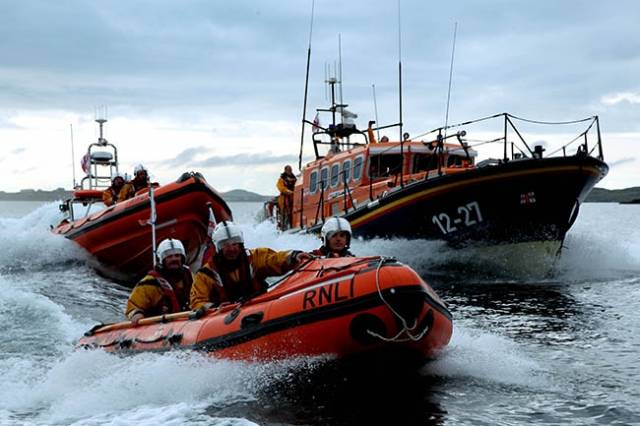Clifden RNLI rescued six people in two separate call outs off the Connemara coast last week.
On Friday afternoon, the volunteer lifeboat crew was requested to launch their all-weather and inshore Atlantic 85 class lifeboats following a report that two people were in the water after their 6ft boat had ran aground and hit rocks.
The lifeboat helmed by Joe Acton and with crew members Dermott Clancy, Alvin Bell and Kenneth Flaherty onboard, launched within minutes and made its way to the scene on the south east side of Davillaun.
With a report that two people had entered the water, the Irish Coast Guard’s helicopter Rescue 118 from Sligo was also tasked and a pan-pan was put out to all vessels in the area to assist in the operation.
Weather conditions at the time were described as dry but blowing a Force 5-6 gale with a choppy sea and a good ground swell.
Clifden’s inshore lifeboat was the first vessel to arrive on scene where the crew observed that the two men had managed to get themselves on the rocks. They were cold and wet and holding on to their boat to keep it afloat.
Lifeboat crew member Alvin Bell was put onto the rocks where he assessed the casualties and ensured they were ok. With no injuries sustained he then proceeded to help them on to the lifeboat where they were further assessed and made comfortable. A towline was then set up and the casualty vessel was pulled off the rocks and brought alongside the lifeboat to prevent further damage.
Following an hour long tow, the two men and their vessel were brought safely back into Derryinver Pier.
Earlier in the week, the lifeboat was called upon on to assist the crew of a 35ft trawler that had got into difficulty on Clifden Bay.
The Atlantic 85 inshore lifeboat was requested to launch at 11.30am on Tuesday (23 August) after gear got tangled in the prop of the trawler resulting in no steerage and no propulsion.
The lifeboat helmed by Joe Acton and with crew members Alvin Bell, Kenneth Flaherty and Eoin Hayes onboard, made its way to scene where they worked with the four crew onboard to set up a towline.
Weather conditions were good with a flat calm sea. However, with the boat running against the tide, helm Joe Acton called on the assistance of Clifden’s D class inshore lifeboat which on arrival helped with the safe manoeuvre of the trawler into the quay at Clifden.
Speaking following the two call outs, Clifden RNLI helm Joe Acton said: ‘We were happy to be of assistance on both occasions last week. Friday’s call out was a bit more challenging following the initial report that two people were in the water but thankfully they had managed to make it on to rocks where they were waiting safe and well if not cold and wet following their ordeal.
‘We would encourage anyone taking to the sea for work or pleasure, to enjoy it but to always respect the water. Always wear a lifejacket and carry a means of calling and signalling for help. Always check the weather forecast and tide times. Make sure someone ashore knows where you are going and who to call if you don’t return on time. Learn how to start, run and maintain your engine before taking to the water.’































































